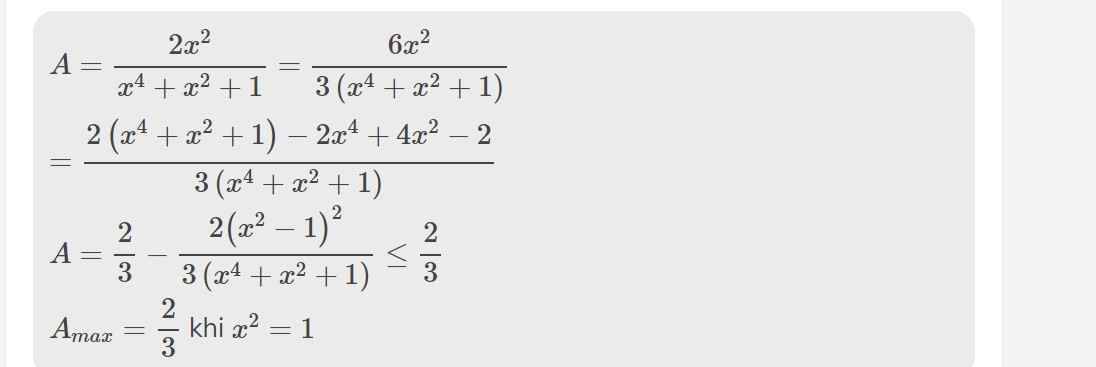
Hãy nhập câu hỏi của bạn vào đây, nếu là tài khoản VIP, bạn sẽ được ưu tiên trả lời.


ĐKXĐ: \(x^2-x+1\ne0\)
=>\(x^2-x+\dfrac{1}{4}+\dfrac{3}{4}\ne0\)
=>\(\left(x-\dfrac{1}{2}\right)^2+\dfrac{3}{4}\ne0\)(luôn đúng)
=>\(x\in R\)

\(a,A=\dfrac{1}{x-2}+\dfrac{1}{x+2}+\dfrac{x^2+1}{x^2-4}\left(dkxd:x\ne\pm2\right)\)
\(=\dfrac{x+2+x-2+x^2+1}{\left(x-2\right)\left(x+2\right)}\)
\(=\dfrac{x^2+2x+1}{\left(x-2\right)\left(x+2\right)}\)
\(=\dfrac{\left(x+1\right)^2}{x^2-4}\)
Vậy \(A=\dfrac{\left(x+1\right)^2}{x^2-4}\)
\(b,\) Theo đề, ta có : \(-2< x< 2\)
\(\Rightarrow x-2< 0;x+2>0;\left(x+1\right)^2>0\)
\(\Rightarrow A< 0\) hay phân thức luôn có giá trị âm

a: \(\dfrac{xy^2}{xy-y}=\dfrac{y\cdot xy}{y\cdot\left(x-1\right)}=\dfrac{xy}{x-1}\)
=>Hai phân thức này bằng nhau
b: \(\dfrac{xy+y}{x}=\dfrac{y\left(x+1\right)}{x}\)
\(\dfrac{xy+x}{y}=\dfrac{x\left(y+1\right)}{y}\)
Vì \(\dfrac{y\left(x+1\right)}{x}\ne\dfrac{x\left(y+1\right)}{y}\)
nên hai phân thức này không bằng nhau
c: \(\dfrac{-6}{4y}=\dfrac{-6:2}{4y:2}=\dfrac{-3}{2y}\)
\(\dfrac{3y}{-2y^2}=\dfrac{-3y}{2y^2}=\dfrac{-3y}{y\cdot2y}=\dfrac{-3}{2y}\)
Do đó: \(\dfrac{-6}{4y}=\dfrac{3y}{-2y^2}\)
=>Hai phân thức này bằng nhau

`a, (xy^2)/(xy+y) = (xy^2)/(y(x+1))`
`=(xy)/(x+1)`
Vậy `2` cặp phân thức bằng nhau.
`b, (xy-y)/x = (y(x-1))/x = (y^2(x-1))/(xy)`
`(xy-x)/y = (x(y-1))/y = (x^2(y-1))/(xy)`
Vậy `2` đa thức không bằng nhau

a) ĐKXĐ `x + 3 ne 0 ` và `x -3 ne 0` và ` 9 -x^2 ne 0`
`<=> x ne -3 ` và `x ne 3` và `(3-x)(3+x) ne 0`
`<=> x ne -3` và `x ne 3`
b) Với `x ne +-3` ta có:
`P= 3/(x+3) + 1/(x-3)- 18/(9-x^2)`
`P= [3(x-3)]/[(x-3)(x+3)] + (x+3)/[(x-3)(x+3)] + 18/[(x-3)(x+3)]`
`P= (3x-9)/[(x-3)(x+3)] + (x+3)/[(x-3)(x+3)] + 18/[(x-3)(x+3)]`
`P= (3x-9+x+3+18)/[(x-3)(x+3)]`
`P= (4x +12)/[(x-3)(x+3)]`
`P= (4(x+3))/[(x-3)(x+3)]`
`P= 4/(x-3)`
Vậy `P= 4/(x-3)` khi `x ne +-3`
c) Để `P=4`
`=> 4/(x-3) =4`
`=> 4(x-3) = 4`
`<=> 4x - 12=4`
`<=> 4x = 16
`<=> x= 4` (thỏa mãn ĐKXĐ)
Vậy `x=4` thì `P =4`
a) P xác định <=> \(\left\{{}\begin{matrix}x+3\ne0\\x-3\ne0\end{matrix}\right.\)
<=>\(\left\{{}\begin{matrix}x\ne-3\\x\ne3\end{matrix}\right.\)
<=>\(x\ne\pm3\)
b)Với \(x\ne\pm3\)
\(P=\dfrac{3}{x+3}+\dfrac{1}{x-3}-\dfrac{18}{9-x^2}\)
\(=\dfrac{3}{x+3}+\dfrac{1}{x-3}+\dfrac{18}{\left(x+3\right)\left(x-3\right)}\)
\(=\dfrac{3\left(x-3\right)+\left(x+3\right)+18}{\left(x+3\right)\left(x-3\right)}\)
\(=\dfrac{3x-9+x+3+18}{\left(x+3\right)\left(x-3\right)}\)
\(=\dfrac{4x+12}{\left(x+3\right)\left(x-3\right)}\)
\(=\dfrac{4\left(x+3\right)}{\left(x+3\right)\left(x-3\right)}=\dfrac{4}{x-3}\)
c)Với \(x\ne\pm3\)
P=4 <=>\(\dfrac{4}{x-3}=4\)
<=>\(4x-12=4\)
<=>\(4x=16\)
<=>x=4(tm)
Vậy x=4

a: ĐKXĐ: x<>1; x<>2; x<>3
\(K=\left(\dfrac{x^2}{\left(x-2\right)\left(x-3\right)}+\dfrac{x^2}{\left(x-1\right)\left(x-2\right)}\right)\cdot\dfrac{\left(x-1\right)\left(x-3\right)}{x^4+2x^2+1-x^2}\)
\(=\dfrac{x^3-x^2+x^3-3x^2}{\left(x-2\right)\left(x-3\right)\left(x-1\right)}\cdot\dfrac{\left(x-1\right)\left(x-3\right)}{\left(x^2+1+x\right)\left(x^2+1-x\right)}\)
\(=\dfrac{2x^3-4x^2}{\left(x-2\right)}\cdot\dfrac{1}{\left(x^2+x+1\right)\left(x^2-x+1\right)}\)
\(=\dfrac{2x^2\left(x-2\right)}{\left(x-2\right)\left(x^4+x^2+1\right)}=\dfrac{2x^2}{x^4+x^2+1}\)
b:


\(M=3\left(\dfrac{1}{2xy}+\dfrac{1}{x^2+y^2}\right)+\dfrac{1}{2xy}\ge\dfrac{12}{2xy+x^2+y^2}+\dfrac{2}{\left(x+y\right)^2}=\dfrac{14}{\left(x+y\right)^2}=14\)
Dấu "=" xảy ra khi \(x=y=\dfrac{1}{2}\)
Áp dụng bđt đã cho ta có \(M=4\left(\dfrac{1}{2xy}+\dfrac{1}{x^2+y^2}\right)-\dfrac{1}{x^2+y^2}\ge\dfrac{16}{2xy+x^2+y^2}-\dfrac{2}{\left(x+y\right)^2}=\dfrac{16}{\left(x+y\right)^2}-\dfrac{2}{\left(x+y\right)^2}=14\).
Đẳng thức xảy ra khi và chỉ khi \(x=y=\dfrac{1}{2}\)

a: |2x-3|=1
=>2x-3=1 hoặc 2x-3=-1
=>x=1(nhận) hoặc x=2(loại)
KHi x=1 thì \(A=\dfrac{1+1^2}{2-1}=2\)
b: ĐKXĐ: x<>-1; x<>2
\(B=\dfrac{2x^2-4x+3x+3-2x^2-1}{\left(x-2\right)\left(x+1\right)}=\dfrac{-x+2}{\left(x-2\right)\left(x+1\right)}=\dfrac{-1}{x+1}\)
\(ĐK:x^2-xy+y^2\ne0\)